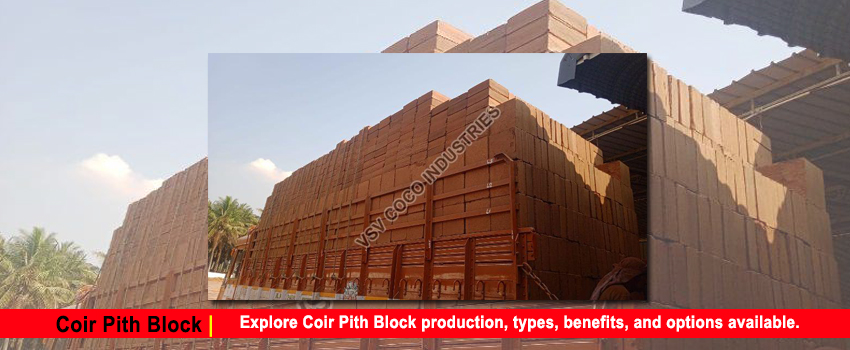Kangayampalayam, Coimbatore, Tamil Nadu
- GST NO. : 33AAIFV0799H1ZU
Coir Pith Block – How It’s Made And Its Different Varieties
Posted by Admin on April, 17, 2024

Coconut fiber, or coir, originated from the husk of a coconut. This is a natural fiber removed from the outer shell of the coconut, which is also called coir pith. Coir or coconut fiber is recycled to create different items like ropes, floor mats, doormats, mattresses, and Coir Fiber Bales. It is a tough material that is useful for its thread-like quality. It is an outstanding soil conditioner and is being widely used as a soilless medium for agro-horticultural purposes. With its moisture-retention abilities, the coir pith is perfect for growing anthuriums and orchids. Obtainable in raw form or transformed into organic manure.
Blocks created with the use of coconut coir prove to be excellent in performance. The performance is judged by relating it to other materials, like synthetic blocks. These blocks are available in different sizes. Supplied by the coir Pith block manufacturer in India.
How is coir made?
Coir pith is extracted from the fibrous outer cover of the coconut palm fruit, with or without retting. Coir fiber is classified based on its environment, picture, color, presence of long and short fibers, crusts, etc.
Types of Coir Pith
There are two types of coir available on the market, supplied by its suppliers.
1. One is brown coir, which is taken out of ripe coconut and used to manufacture sacking, upholstery padding, and horticulture. It is strong and highly unaffected by abrasion; hence, it is used mainly in brushes.
2. Another one is white coir, which is extracted from unripe coconut and used to manufacture strings and fishing nets. This fiber is silky soft and less robust than brown coir. It is normally twisted to make yarn, which may be used to create mats or twisted into twine or rope.
How is coir pith made?
The long, stiff, and conventional strands of fiber are called bristles. These bristles are categorized as the basic grade, called 1 tie fiber, and after that, they are categorized into 2 tie, 3 tie, and so on, depending upon the length of the strands and the quality of the fibers. These fibrous materials are saturated in nets or pits to soften and swell the fibers.
After the process of soaking, the fibrous materials are treated, where they are crushed until the husk detaches and becomes loose fibers. The loose fibers are then dried out in the sun, and after that, brushes are made out of them.
Being one of the thickest and sturdiest of all-natural fibers, it is a small and coarse fiber with a low rotten rate.
Benefits of Coir Pith Block are:
• Easy to use
• Environment-friendly
• Durable
• Low decay rate
• Cost-effective
• High-performance surety
These Coir Pith blocks have started gaining admiration in the market because of their outstanding performance. They are observed as one of the strongest and thickest fibers. These blocks are highly abrasion-resistant while being tough. There are coir pith block manufacturers in India, and there are so many who deal in a wide variety of coir fiber beads at competitive rates.
Qualities of the Top Coir Pith Block Manufacturer in India
• Huge manufacturing capacity
• Prior experience
• Prompt delivery
• Wide range in size
• High-quality assurance
• Usage of quality raw materials
This entry was posted on April, 17, 2024 at 09 : 49 am and is filed under Coir Pith Block. You can follow any responses to this entry through the RSS 2.0 feed. You can leave a response from your own site.
Search
Category
Recent Posts
